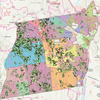Lack of resources restricts special-needs care
— Photo from Jessica Lawrence-Cole
Christy Arsenault, center, stands in her graduation gown next to her brother, Christian Arsenault, and her mother, Jessica Lawrence-Cole. Lawrence-Cole has been having such trouble getting Christy, who is autistic and has a traumatic brain injury, into an adult day-care program that she is considering selling their home to move to another area.
ALBANY COUNTY — Lack of staff has constrained special-needs organizations’ ability to offer care to Albany County residents, particularly those in remote areas, forcing one mother to consider leaving her home for the sake of her children.
After graduating from the Wildwood School, a private not-for-profit school for special-needs individuals, Christy Arsenault, who is autistic with a traumatic brain injury, was expected to transition into a day program at any one of the several organizations that serve Albany County residents, where she would learn basic life skills and socialize with her peers.
But Arsenault’s mother, Jessica Lawrence-Cole, told The Enterprise that she has been unable to get her daughter placed anywhere because organizations either lack the staff or are unable to provide transportation for Arsenault from the family’s home in Berne, which they had moved to after a care manager had suggested that finding adult day programs would be easier in the Capital Region.
“We’ve reached out to all the programs in the area …,” Lawrence-Cole said. “We’re at the point where we’re going to sell our house that we bought in November ’21 so we can get the services my kids need.”
Arsenault is 22, but, according to her mother, functions at the level of an 8-year-old. A day program is necessary to teach skills she currently struggles with, like washing dishes and doing laundry, while also having an opportunity to be with other special-needs people.
“They’re losing skills by not being in a program, but they’re also losing skills by not interacting with each other, and not having peer friends,” Lawrence-Cole said.
“A 21-year-old,” she said, “you think they’re going to be going to college, they’re going to be going to the bar at night, or they’re going to be playing pool. These individuals, that’s not where they mentally are.”
Lack of resources
Dan Murray, executive director of Warren-Washington-Albany ARC, one of the organizations that was unable to accept Arsenault into its day program, told The Enterprise that the organization has been grappling with staffing issues since the pandemic, and that, while the numbers have gotten better since the worst of it, staffing has not returned to pre-pandemic levels.
“You can’t overcommit staffing to people with disabilities,” he said, “because then you’re going to be getting into a health and safety issue that you don’t want to get into. It wouldn’t be fair to anyone.”
Murray estimated that, before the pandemic, the ARC’s day program served around 220 people, and now serves 150, and is working with the 70 families who had previously been getting service on returning or finding another option.
“I feel terribly that we can’t serve everybody that is out there, but we have an obligation to do it in a manner which provides top-notch services and meets the needs of everyone,” he said.
State Senator Patricia Fahy, an Albany Democrat who chairs the senate’s Disabilities Committee, told The Enterprise that funding is a major issue for disability providers and that, given the cuts happening at the federal level, is apt to “get a lot worse before they get better.”
She said that the Center for Disability Services, which has several locations in the Capital Region, is in the middle of expanding to help reduce its waiting list, which is currently between 150 and 180 individuals.
“It’s tens of millions of dollars to do that expansion,” Fahy said.
Finding staff can be difficult because the work is hard and the pay is low, Fahy said, and raising wages for such a large group is expensive, which she termed a “massive, massive annual fight” in the state budget.
“This year, they asked for an increase of 7.8 percent,” Fahy said. The state ultimately granted 2.6 percent, she said, up from the governor’s proposal of 2.1 percent.
“Because those are annual operating dollars,” Fahy said, “and for every point you increase, it increases so many millions upon millions of dollars for the whole system.”
Murray said he was grateful for the state’s Medicaid increases over the last few years because they make a big difference for staff — but the increases followed “nothing for years and years,” creating a wage deficit that’s hard to make up.
He said that staff were making less than what they could earn working at a fast-food restaurant and, while it’s better now, “we’re still not where we need to be.”
With the cuts to Medicaid that are expected from President Donald Trump’s so-called “Big Beautiful Bill,” which was passed by the House of Representatives and awaits finalization in the Senate, could be devastating for the industry and families that rely on it, Fahy said.
“If you cut our Medicaid 20 percent,” she said of New York State’s share, “think of how much harder this is going to get … We’re heading for very difficult times. I can’t even sugarcoat that. I lose a lot of sleep over it.”
Murray told The Enterprise that about 90 percent of the ARC’s funding comes from Medicaid, but when asked about cuts, said he tries not to speculate on things that are out of his control.
“You have to wait and see what happens,” he said.
Other options
“It’s really hard for parents of adult children with disabilities,” the father of a Hilltown resident, who hosted social gatherings for his adult special-needs son, told The Enterprise five years ago. “When they’re in school, there’s a lot of programs and support. After they turn 21,” he said of the age when school services end, “it’s so difficult.”
That family worked with a Self Direction liaison, through the state’s Office for People With Developmental Disabilities, which provides services directly and through a network of about 650 not-for-profit agencies as well as state-run services.
“Two days, he goes out in the community for Dayhab; two other days, we’ve hired aids that spend one-on-one time. They take him out in the community,” the Hilltown father said, describing his son’s schedule. “One day, he works at Blaze Pizza in Schenectady, folding pizza boxes. He accomplishes something and he gets paid.”
He concluded, “It’s important they have something to do every day just like everyone else … We’ve spent the last three years trying to get his week filled in. It’s been a painful process.”
Lawrence-Cole said that, without being able to find services at a traditional facility, she’s tried starting up her own day-group that would include her daughter, along with two other people from Schenectady and Schoharie counties who also have not been able to get placement. But she hasn’t been able to get authorization to do so.
Lawrence-Cole said the set-up would be each person and their staff meet up somewhere to “do a quick activity, so we all know what’s going on that day, and then we would go to a YMCA or, if it’s warm enough still, go to a park and work on walking around a little bit and just interacting.”
Whatever the solution, Lawrence-Cole said, she’s also worried about her other child with special needs, a son who’s expected to age out of school in eight years and require the same services that Arenault is having trouble getting.
“I cannot do that to him,” she said.



